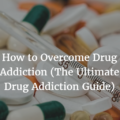Drug-induced psychosis, also known as substance-induced psychotic disorder, can be defined as any psychotic episode that is linked with the use or abuse of an intoxicant, chemical or drugs, including those produced by the body itself. This can occur from taking too much of certain medications and drugs such as alcohol or cannabis, having an adverse reaction after mixing substances, underlying mental health issues or during withdrawal from a drug.
Drug Induced Psychosis Treatment
According to the Substance Abuse and Mental Health Services Administration’s (SAMHSA’s) National Survey on Drug Use and Health, 9.3 percent of individuals in the US aged 12 years and over needed treatment for a drug or alcohol problem in 2009. This does not include people who occasionally abuse drugs but are not considered to have a dependence issue. This amounts to 23.5 million people for that single year alone. Drug induced psychosis can be temporal or permanent and can be cured, this however depends on several other factors. The first step in any treatment for drug induced psychosis is to stop the use and abuse of any substance. In many cases this is not possible without the assistance of rehabilitation specialists which often include physicians and mental health specialists because of addiction and adverse withdrawal symptoms which are virtually unavoidable after long-term substance abuse.
The effective treatment of substance-induced psychosis is possible because there are plenty of options for drug and alcohol addiction treatment. Medically supervised detox programs can easily prevent the more severe symptom of psychosis through the use of common medications or by tapering off the substance rather than quitting cold turkey.
Phases in Substance Abuse Rehab Process
Phase 1: Diagnostics and Evaluation in Drug Rehab
Diagnostics and evaluation in Drug rehab involves the assessment of the frequency and severity of drug abuse and the extent of addiction. The diagnostic and evaluation process is critical in drug rehab as it provides a platform for the collection and analysis of critical information such as family history, mental health records, medical records, nutritional information, Drug combined substances abuse and other information that are vital in making decision on best treatment options, duration of treatment and other important decisions that are vital to the success of any drug rehab program.
Phase 2: Detox in Drug Rehab
Detox in Drug rehab involves the removal from the body of accumulated drug related “toxins”. This process is very important in drug rehab and drug addiction recovery. Detox in drug rehab is carried out with the help of psychologists, physicians and other medical professionals due to the potential for serious, uncomfortable withdrawal symptoms which can be potentially life-threatening, if not handled properly. This is because the excessive consumption of substances like alcohol suppresses the brain’s neurotransmitters and once the supply of the substance is reduced or stopped inside the body, there is an increased tendency for this change to send the body, brain neurotransmitters and blood levels into shock. Patients can expect the following detox symptoms during drug rehab:
Symptoms of Detox in Drug Rehab
- Seizures
- Irritability
- Vomiting
- Depression
- Anxiety
- Extreme Fatigue
- Sweating
- Nausea
- Mood swings
- Rapid heart rate
- Dangerous dehydration
- Drugic tremors
- Delirium Tremens (aka DTs)
Phase 3: Counseling in Drug Rehab
Counseling in Substance abuse rehab involves a trained therapist listening and helping the individual undergoing rehab find ways to deal with emotional issues relating to drug addiction. There two types of modes of counseling in drug rehab, these are:
Individual Counseling Sessions
These are one-on-one meetings with an addiction treatment counselor during which the issues and events that may have contributed toward drugism are explored. During these sessions, patients learn about Drugism as a disease, drug addiction triggers, important coping skills, and healthy routines that are critical for ensuring the success of the drug rehab process
Group Counseling Sessions
Group counseling sessions in substance abuse rehab can be as small as three or four people, but often involve around seven to twelve recovering addicts in the program. They provide a unique opportunity for sharing life experiences and lessons learned. In so doing, a peer support network develops. During these sessions erroneous thinking and walls of isolation are exposed and addressed promoting healing, healthier living, emotional and therapeutic support.
Aftercare in Drug/Substance Abuse Rehab
Aftercare in substance abuse rehab is a necessary part of treatment for drug disorder that lasts much longer than the rehab program. It involves a carefully curated aftercare regimen that provides a coordinated network of support to help a recovering individual maintain and build on the progress made in the first 3 phases of substance abuse rehab. This step is the most important of all the processes, for it is during this crucial period that strides made during recovery are reinforced and it also provides an opportunity to do outpatient rehabs test for drug. Another major importance of aftercare in substance abuse rehab is the prevention of relapse which according to available statistics ranges from 37%- 56% among people with Substance Abuse Disorder (SUD), who currently constitute about 9% of the total population of the United States or 21.5 million people National Survey on Drug Use and Health (NSDUH). See : How Long Does Drug Induced Psychosis last?





